The program "Teacher for Russia". Hoping to improve Russian schooling
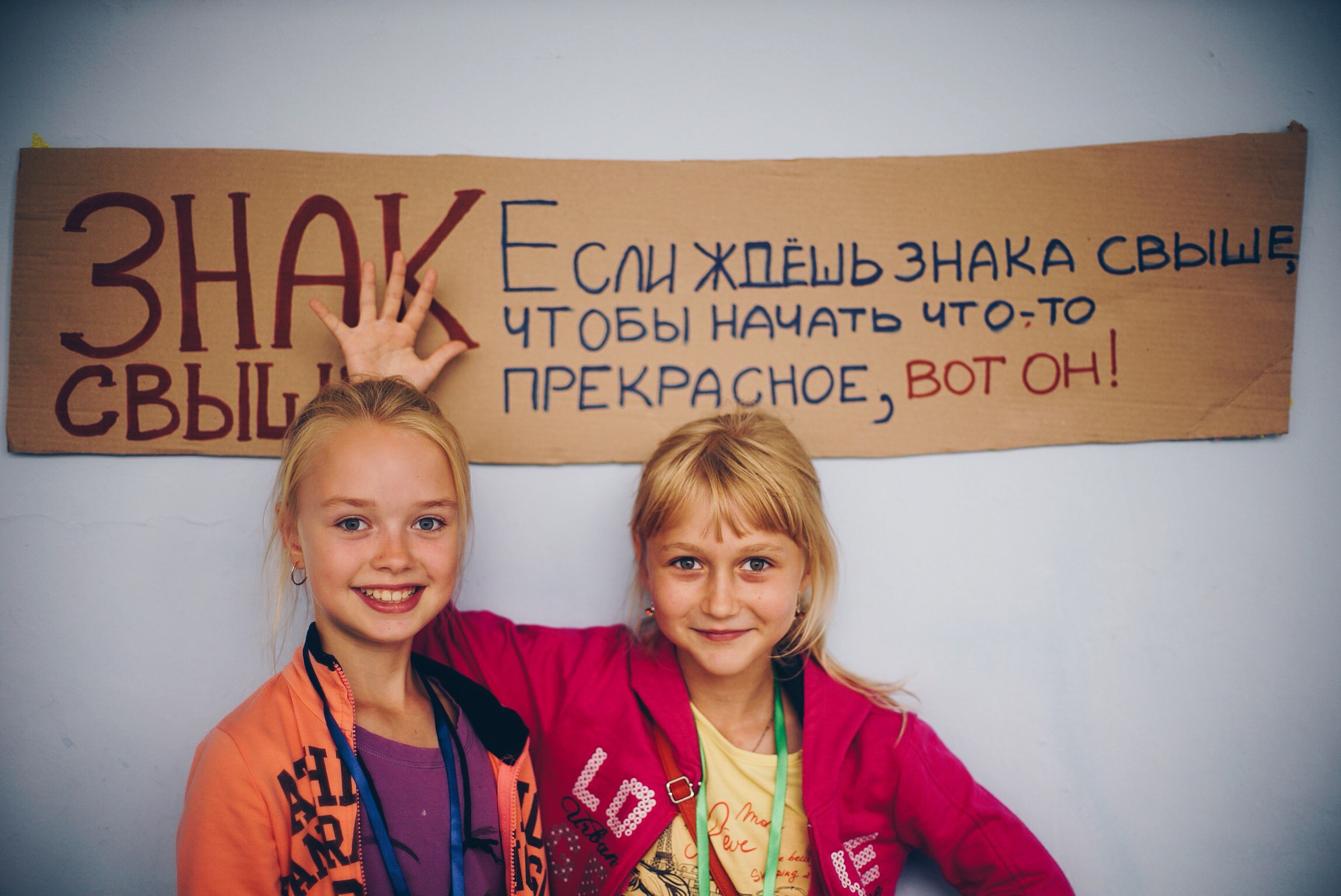
On Thursday, October 8, at 3:00 pm, a classmate, friend and boss ( on whose behalf I publish this post ) set me, a historian by training, the task of writing an article for Habrahabr about why Hab users should ( ! ) Go to work in school Carry rational, kind and eternal. And so that the article does not look like an advertisement ( teacher’s work? ), But it would also be with statistics, in order to have more figures and reliance on science. In general, in the formulation of the problem almost the entire arsenal of stereotypes about those who live here was involved. Nevertheless, it is here that you need to tell about it.
We in the project “ Teacher for Russia ” , which was launched this year, want to attract the most talented, the best of the best to work at the school. Even Yandex agrees with us and invites one of the presentations of our project to hold with them. Habrahabr is famous for its audience, and we came here in search.
')
So. We recruit teachers to schools. It would seem that the Russian state is currently engaged in the same, but as you no doubt know, there are some nuances.
Who works in the school system today?
According to the State Statistics Committee, in the 2014-2015 academic year, 1052 thousand teachers worked in schools.
81% of them are women.
84% - with higher education.
The average age is 52 , while the average age of a Russian is 39.4 .
With an average salary of 17,000–20000 rubles. per month ( except for Moscow ). And this is taking into account the experience of more experienced teachers and after calculating all allowances.
And this means that with all due respect for people who perform one of the most important tasks for the survival and existence of our society, middle-aged educated women work in the school for little money.
“It has always been like this” (actually, no). Why is that bad?
Our colleagues from “ Prodlenki ” have already written here about how “digital immigrants” (teachers) teach “digital natives” (modern students). That is, in the same class during the same lesson there are people from different worlds at the same time. Often this leads to the fact that the students and teachers have a different, but at the same time similar goal - to survive ( to survive the moment of joint communication ). Achieving this goal, however, does not contribute to the realization of the main task of the education system, that is , education itself .
According to the International Program for the Assessment of Educational Achievement of Students ( Program for International Student Assessment / PISA ), in 2012 Russia was ranked 34th among 65 states in terms of mathematical literacy. Here is more than an eloquent picture:
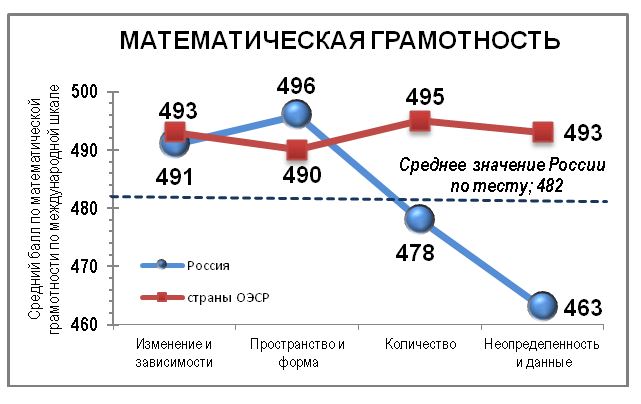
The USSR was the most reading country in the world. At least that's what Soviet propaganda said. And what about Russia? According to the data of the same PISA in terms of reading literacy, our students are even lower - in 37th place out of 65 . And judging by the next picture, they are able to search for information, but sometimes they are at a loss in order to evaluate the findings and put them into practice. That is reading for the sake of reading. Search for search. It is fascinating, but not about development.
This, by the way, is connected with the traditional school question: “ How will geometry / algebra / history / geography come in handy in life? ” With the current approach - in any way. That is, in the framework of school education, students are actually accustomed not to evaluate the information received, not to look for practical significance in it, but to memorize.
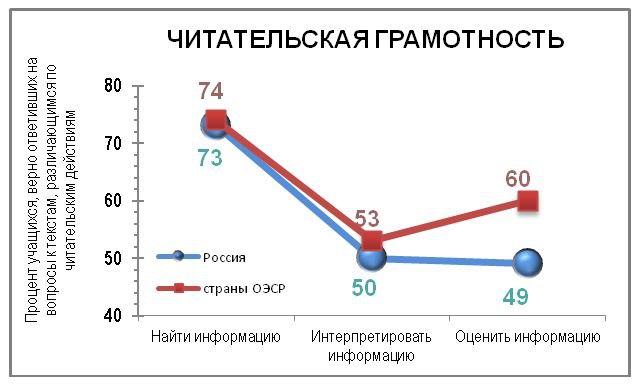
Source: Clearinghouse for Cooperation with the Organization for Economic Cooperation and Development
Not the best way things are with the natural sciences. S. S. Berdonosov , Doctor of Chemistry and teacher of secondary school No. 171 ( Moscow ), writes in his article on the crisis of school chemical education:
"It is obvious that for the successful development of Russia in the coming decades, it is extremely important to ensure a high level of chemistry teaching at school and to involve well-trained secondary school graduates in research and production activities."Source: "The First of September . "
And it is necessary to remind once again that teachers, mostly elderly women, who have rich but already established experience of communication with students, and therefore their methods , including educational work, remain virtually unchanged .
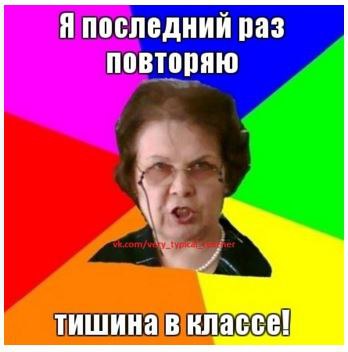
Source: vKontakte group “Typical teacher”
Thus, the current education system, one of the key components of which is the teaching staff, often not understanding their students, slowly but surely ensures a reduction in the level of knowledge and skills of schoolchildren in all areas, which in turn affects the life of the whole country and that dd and so on and so on
But what about pedagogical universities?
Pedagogical universities are wonderful. For example, the Moscow State Pedagogical University or the Russian State Pedagogical University. A.I. Herzen in St. Petersburg. But in general, the picture is sad. As a rule, weak high school graduates enter such universities, only 5% of them actually want to work in a school. And only 20% of graduates of these universities come to schools. In general, while pedagogical universities do not help to solve the problem of rejuvenation of the teaching staff.
What is offered?
In 1863, N. G. Chernyshevsky wrote a book, in the title of which he took one of the eternal Russian questions: " What to do? ". The state authorities of Russia also tried to answer this question regarding the development of the school system. In the state program " Development of Education " for 2013 - 2020 among the "fundamental changes" that should occur before 2020 , are called:
- “A qualitative change in the content and methods of teaching with a focus on the development of interest and activity of students, the formation of a full-fledged system of specialized education based on individual curricula, advanced updating of programs for teaching mathematics, technology, foreign languages, social sciences ...;
- rejuvenation and growth of the professional level of teaching staff ...;
- a significant increase in the scale and efficiency of the use of non-formal resources (beyond the framework of children's additional education organizations) and informal education (media, Internet). ”
What are we doing?
We will be able to judge how effective the state program will be only in 2020 , when the period for which it is designed will come to an end. However, in the project “ Teacher for Russia ” we ourselves wondered how we can help the mentioned “fundamental changes” to occur.
To solve this problem, we turned to international experience - the project Teach for all , whose experience formed the basis of its Russian localization. Similar projects exist in 36 countries of the world: Great Britain, Germany, Sweden, Australia, India, China, etc. They include more than 15 thousand teachers all over the world.
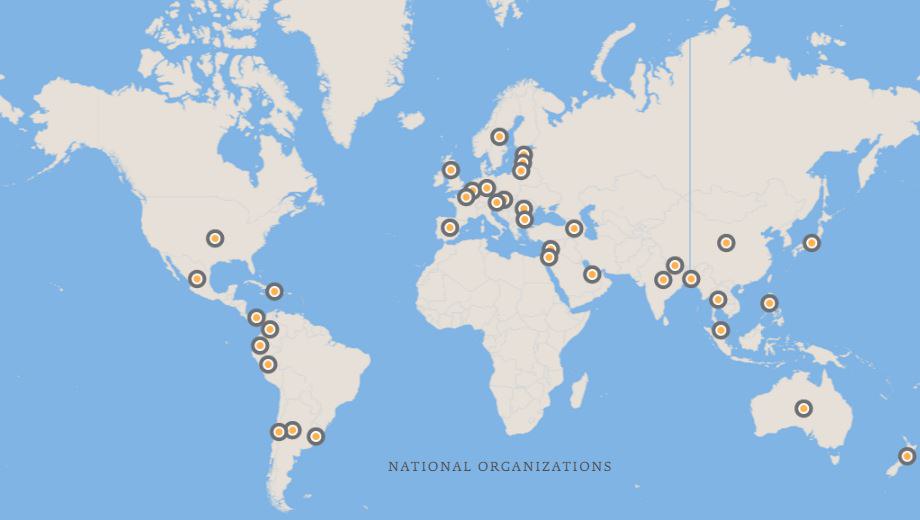
Source: Teach for All
For example, in the UK, the GSCV ( British equivalent of the Unified State Exam ) delivery statistics in schools where project participants went to work ( on the islands is called Teach First ), has significantly improved relative to other schools ( 0% on the chart ).
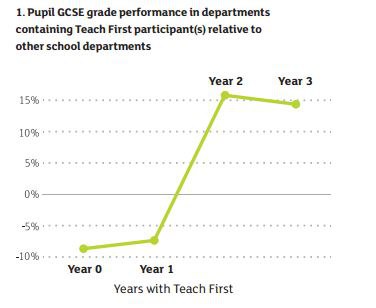
Source: Teach First
According to research by the US Department of Education, math teachers who came to American schools as part of a similar program ( Teach for America ) turned out to be more effective than their colleagues.
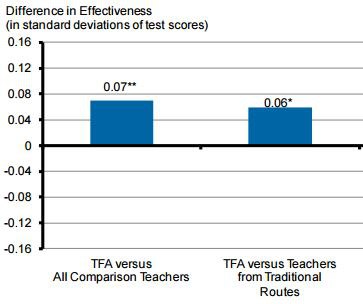
Source: Teach for All
In the same place, in the USA, 50% of program participants continue to work in schools after its completion. Moreover, they themselves have opened 800 schools across the country.
But statistics from another part of the world. India.
- 98% of the directors of Indian schools participating in the Teach for India program believe that it uses innovative methods of teaching lessons that are more interesting for students than traditional methods.
- 92% of the same directors recommended the methods of our program participants to other teachers.
How does this work?
1. Selection of the best university graduates for participating schools. If you send random people to random places, you can get a completely random result. That is why we conduct a four-stage selection of all project participants, offering to fill out a questionnaire, get a skype-interview and participate in the Evaluation Center. The last stage of selection is the Summer Institute. Training in it is a direct preparation for going to school, practice. As a result of it, both we and the participants of the program finally make a decision on readiness to go to children as teachers from September 1.
Thus, we select those who want to make schooling better, ready to invest their knowledge and skills in this, and develop skills. It does not matter whether the participants in the program have a pedagogical education. The personal interest of everyone, the ability to think extraordinarily, the willingness to take responsibility for their words and deeds is important for us.
Last year we received 489 applications for the program, after the first two stages of selection, 98 remained. 42 young teachers went to work in schools in Moscow, Voronezh, Moscow and Voronezh regions .
Here is what they say:
2. Intensive pedagogical training. We do not send young teachers to children who are not prepared so as not to injure the children themselves in the first place.
Such training begins in the summer at the aforementioned Summer Institute, where future teachers spend 5 weeks , sometimes 12 hours a day, undergo intensive training from the country's best teachers, coaches, education specialists, receiving a large amount of theoretical and, above all, practical training. , knowledge.
It is now accepted to repeat that education should be continuous. This also applies to teachers. Participants in our program throughout their participation in it undergo training, participate in master classes and do not cease to improve. In addition, they work with a coach who is not directly involved in pedagogy, as well as with a teacher who is a specialist in the subject that they teach.
3. We expect that in two years, while the program lasts, the professional development of our teachers will occur. The teachers from the first set began their work in schools on September 1, 2015 , so this item is still our expectation. We are doing everything that depends on us to make our plans fulfilled. In the second year, program participants will develop their own social project with the possibility of receiving a grant for its implementation.
Based on this technique, we went ahead. Our partners were Sberbank of Russia , the Higher School of Economics , Yandex , which I already wrote about above.
Do we believe that we will succeed?
Believe it. Understanding the situation in which the education system is located in our country, and the path that countries have taken in the framework of the Teach for All program, generates not just faith, but confidence in the correctness of what we are doing.
All this allows not only to introduce modern educational methods and technologies in schools and to create a different image of a successful teacher. By sending young teachers primarily to regional schools, we strive to solve the problem of unequal access to quality education. The PISA study mentioned many times already clearly shows that the level of teaching in schools of million-plus cities and all other schools of Russia is fundamentally different.
Change is important for us. And hope for you too.
Alexey Stolyarov
Source: https://habr.com/ru/post/295532/
All Articles